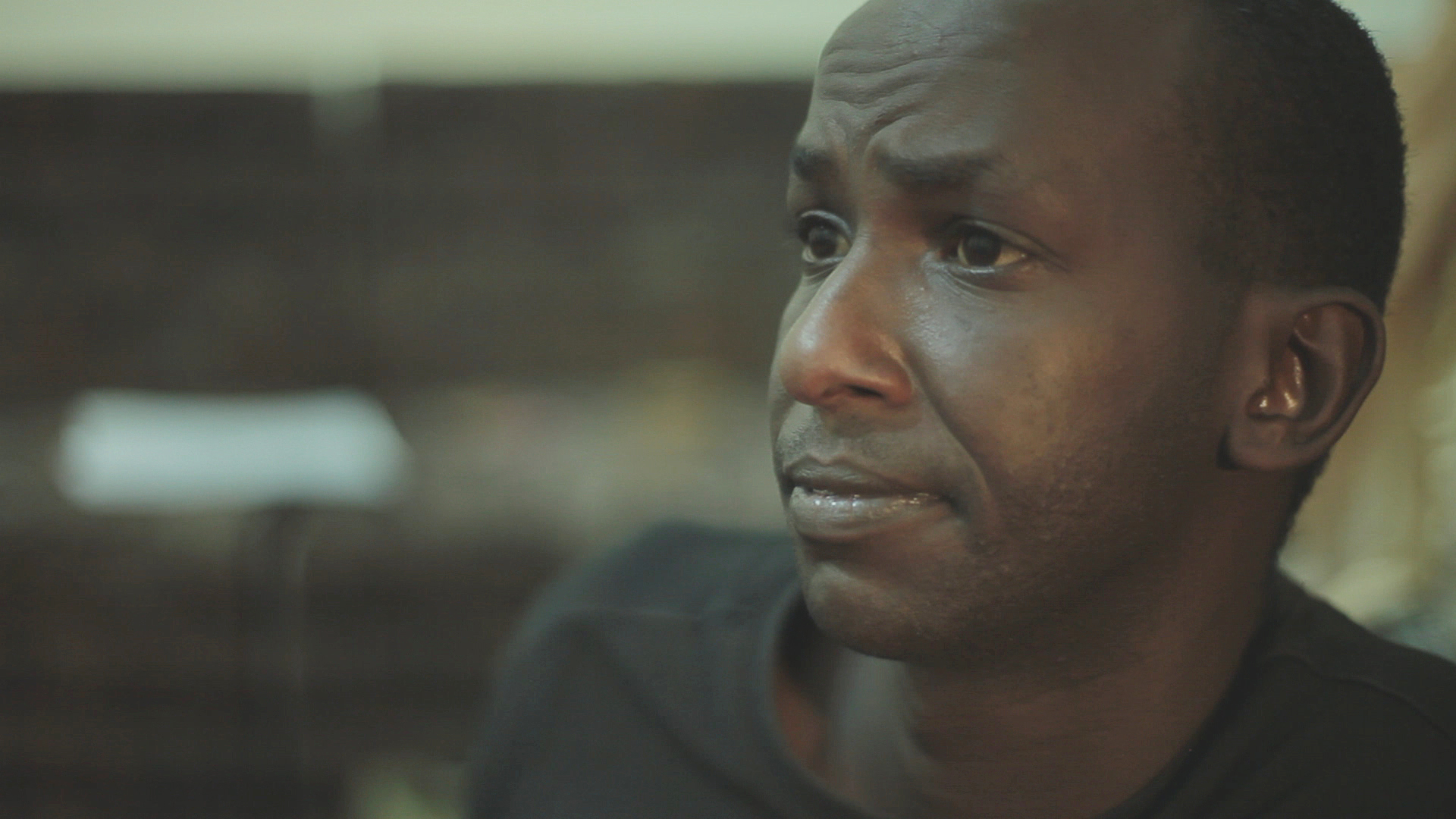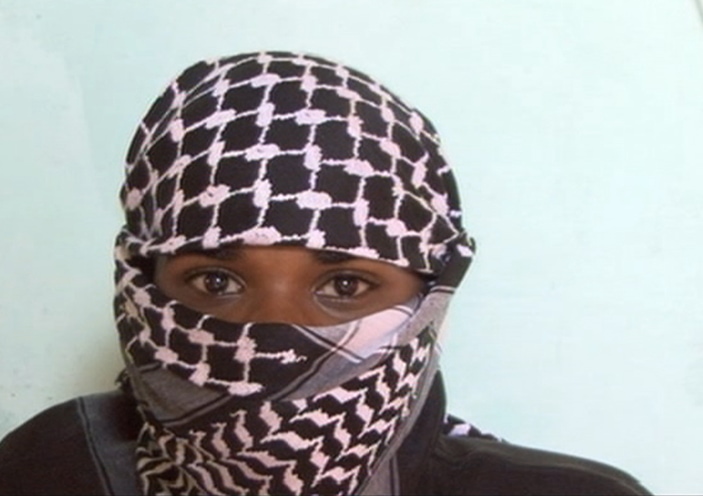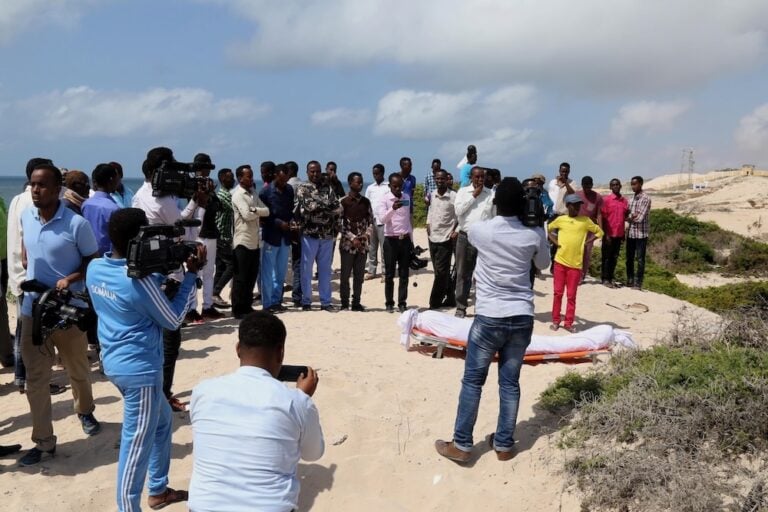Danish-Somali director Nasib Farah spoke to IFEX about his latest documentary, Warriors from the North, and what it was like getting up close and personal with young Al-Shabaab fighters and defectors.
“I was a lonely boy in school and at work as well. So I decided to come here to Somalia. I don’t know … That’s just what I did. I wanted to kill as many people as possible.”
The young Somali-Finnish Al-Shabaab fighter stares straight into the lens of the camera as he speaks. He wears a black and white checkered scarf wrapped around his head and lower face. Only his eyes remain uncovered, betraying his youth and a certain vulnerability that doesn’t match our preconceived notions of how a militant extremist should look and act.
He is just one of several Al-Shabaab militants and defectors interviewed for the Danish documentary, Warriors from the North, which revolves around young Somali-Scandinavian men who choose to leave the West behind and travel to Somalia – a country still reeling from a decade-long civil war – to fight for and, in some cases, die for, a jihadist ideology.
Others are putting themselves at risk in order to report on that story.
Directors Nasib Farah and Søren Steen Jespersen have released their documentary at a time when ISIS, Al-Shabaab, and Boko Haram have become household names, and the international media is bursting with articles attempting to answer one burning question: Why are so many Westerners joining ISIS? Or Jabhat Al Nusra, or Al-Shabaab, or Boko Haram, for that matter. Many pieces are speculative, others analytical. An element that sets this documentary apart is that it’s narrated by an insider, a young Somali-Danish defector dubbed “The Shadow”.
“It is easy to condemn them, but it is far more interesting and important to try to understand them,” Jesperson was quoted saying in the documentary’s press materials.
When speaking to the audience at Toronto’s Hot Docs Film Festival in May 2015, he was quick to note that without Farah’s invaluable connections to the Somali community in Denmark, and to his native land, Somalia, he couldn’t have pulled off such an insightful look into the lives of some of those most susceptible to Al-Shabaab’s manipulation.
“I know several of the warriors personally,” said Farah, who was only 11 when he fled the civil war in Somalia alone and sought asylum in Denmark. “I went to the same youth club as Abdi, who killed himself and the medical school graduates in a suicide bombing … My background and my life are very similar to his, and to that of the other Al-Shabaab warriors. We are Danes with Somali heritage.”
The documentary took four years to make, and during that time, Farah met with jihadist recruits who had traveled to Somalia to join Al-Shabaab.
Al-Shabaab, an Islamist militia group and affiliate of Al-Qaeda, has been waging a war against the Somali government since 2009. Given that Somalia remains one of the most dangerous countries in the world to be a journalist, securing these interviews was no small feat.
The group has claimed responsibility for many bombings, including suicide attacks, in Mogadishu, in central and northern Somalia, and in neighbouring countries. They have specifically targeted journalists, whom they claim are spies. According to Reporters Without Borders (RSF), Al-Shabaab is responsible for most of the 45 murders of journalists in Somalia since 2007.
In his communications with Al-Shabaab’s foreign recruits, Farah was both persistent and cautious. It took him a long time to convince those interviewed that he wasn’t working undercover and that he wasn’t affiliated with the government. He jumped at any opportunity to meet them in person and to build trust.
At the same time, when he stayed in Somalia, Farah rarely slept in the same location twice – and with good reason. Just recently, on 1 May 2015, gunmen murdered radio journalist Daud Ali Omar and his wife in their bed in the hours after midnight. Daud, 35, had worked for Radio Baidoa, a privately-owned radio station considered to be pro-government in its coverage of regional violence and local politics.
A network of local journalists, individuals he now calls friends, helped Farah navigate this turbulent landscape. They helped him land the interviews and, in most cases, film them.
Somali journalists risk their lives every day in order to report on a highly volatile conflict. Farah made that starkly clear when asked about his relationships with some of the country’s local reporters.
“I’m very lucky,” he said, speaking with IFEX. “Only two of my friends died in suicide bombings.”
The actions of Al-Shabaab militants aren’t the only dangers journalists have to worry about. They also have to deal with tribal warlords, common gangsters, pirates, and government officials. The Somali government has played its own role in cultivating a culture of impunity and disrespect for journalism as a profession.
“They will all try to hurt you if they don’t like what you say,” said Farah.
According to Human Rights Watch’s latest World Report, government harassment and intimidation of journalists deemed critical of government policy, particularly by the National Intelligence and Security Agency (NISA), increased in Mogadishu in 2014. The National Union of Somali Journalists also released a report detailing the violations journalists were subjected to in Somalia that year.
To make matters worse, in May 2015 the Somali government banned journalists from using the name Al-Shabaab in their reporting. Instead, they ordered them to refer to the militant group as “the group that massacres the Somali people”. While this may seem like a good-intentioned attempt to refuse to pander to terrorism, it has made journalists who comply with the ban be seen as pro-government, hence walking targets for Al-Shabaab. Those who don’t comply are perceived as Al-Shabaab sympathizers, instead, further aggravating an already hostile work environment.
Warriors From the North is not Farah’s first attempt at humanizing the Somali context. In 2007, at the height of Somalia’s piracy crisis, he co-directed a documentary entitled My Cousin the Pirate. When word reached Farah that his cousin wanted to become a pirate, he decided to go back to Somalia to try to talk him out of it and film the process.
“The picture I get of Somalia in the Western media is not the same as what Somalis are telling me,” says Farah, when explaining what drives him to create documentaries where Somalis are allowed take control of their own narrative.
“I hope that one day it will be easier to be a journalist in Somalia, so they can tell their own history for the world,” he continued.
“It is easy to condemn them, but it is far more interesting and important to try to understand them.”Director Søren Steen Jespersen

Danish-Somali documentary filmmaker Nasib Farahmadeincopenhagen.net / press materials
“I can always leave Somalia and come home to Denmark. Local journalists can’t do that, they can’t escape.”Co-director Nasib Farah



